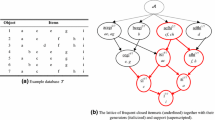Abstract
This paper introduces a new algorithm of mining association rules. The algorithm RP counts the itemsets with different sizes in the same pass of scanning over the database by dividing the database intom partitions. The total number of passes over the database is only (k+2m-2)/m, wherek is the longest size in the itemsets. It is much less thank.
Similar content being viewed by others
References
Agrawal R, Imielinski T, Swami A. Mining association rules between sets of items in large databases. InProc. the ACM SIGMOD Conference on Management of Data, Washington D.C., May 1993, pp.207–216.
Sergey Brin, Rajeev Motwani, Jerry D. Ullmanet al. Dynamic itemset counting and implication rules for market basket data. InProceeding of the ACM SIGMOD International Conference on Management of Data, Volume 26, 2 of SIGMOD 28 Record, New York, May 13–15 1997, ACM Press, pp.255–264.
Agrawal r, Srikant R. Fast algorithms for mining association rules. InProc. the 20th Int. Conf. Very Large Databases, Santiago, Chile, Sept. 1994, pp.487–499.
Charu C Agrawal, Philip S Yu. Mining large itemsets for association rules. InBulletin of the IEEE Computer Society Technical Committee on Data Engineering, March 1998, pp.23–31.
Savasere A, Omiecinski E, Navathe S. An efficient algorithm for mining association rules in large database. InProceedings of the Very Large Data Base Conference, Zurich, September 1995, pp.432–444.
Hannu Toivonen. Sampling large databases for association rules. InProceedings of 22nd International Conference on Very Large Data Bases, Mumbai, India, Sept. 1996, Morgan Kaufmann, pp.134–145.
Mohammed Javeed Zaki, Srinivasan Parthasarathy, Wei Liet al. Evaluation of sampling for data mining of association rules. Technical Report 617, Computer Science Dept., U. Rochester, May 1996.
Cheung D, Han J, Ng Vet al. Maintenance of discovered association rules in large databases: An incremental updating technique. InProc. 1996 Int. Conf. Data Engineering, New Orleans, Lousiana, USA, Feb. 1996, http://www.cs.hku.hk/~dcheungs/publication/icde96.ps
David W L Cheung, Lee S D, Benjamin Kao. A general incremental technique for maintaining discovered association rules. InProceedings of the Fifth International Conference on Database Systems for Advanced Applications, Melbourne, Australia, March 1997, pp.185–194.
Shiby Thomas, Sreenath Bodagala, Khaled Alsabtiet al. An efficient algorithm for the incremental updating of association rules in large database. InProceedings of the 3rd International Conference on Knowledge Discovery and Data Mining, 1997, pp.134–145.
Charu C Agrawal, Philip S Yu. Oline generation of association rules. Technical Report RC 20899 (926090), IBM Research Division, T.J. Watson Research Center, Yorktown Heights, NY. June 1997.
Cheung D, Ng V, Fu Aet al. Efficient mining of association rules in distributed database.IEEE Trans. Knowledge and Data Eng., 1996, 8(6): 911–922.
Author information
Authors and Affiliations
Corresponding author
Additional information
LI Qingzhong received his B.S. degree in computer software form Shandong University in 1989 and his Ph.D. degree in computer science and technology from Institute of Computing Technology, The Chinese Academy of Sciences in 2000. He is now an associate professor of Shandong University. His research interests include database systems, data mining.
WANG Haiyang received his B.S. degree in computer software from Shandong University in 1988 and his Ph.D. degree in computer science and technology from Institute of Computing Technology, The Chinese Academy of Sciences in 1999. He is now a professor of Shandong University. His research interests include database systems, data flow system.
YAN Zhongmin is now a B.S. candidate of Department of Computer Science of Shandong University. Her research interests include database systems, data mining.
MA Shaohan is now a professor of Shandong University. He is also a Supervisor of Ph.D. candidates. His research interests include algorithm analysis, artificial intelligence.
Rights and permissions
About this article
Cite this article
Li, Q., Wang, H., Yan, Z. et al. Efficient mining of association rules by reducing the number of passes over the database. J. Comput. Sci. & Technol. 16, 182–188 (2001). https://doi.org/10.1007/BF02950423
Received:
Revised:
Issue Date:
DOI: https://doi.org/10.1007/BF02950423




